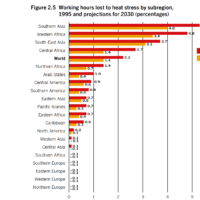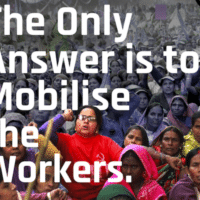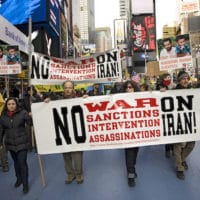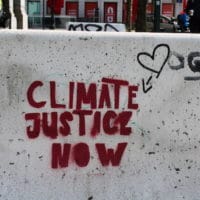-
The U.S.-Iran standoff can only end when the U.S. accepts Iran’s right to have a nuclear energy program
The U.S. objection to Iran is not based on international law, but merely based on its political objectives. This is clearly illustrated by open U.S. support for nuclear energy and nuclear weapon development in India; and nuclear weapon stockpiling in Israel, which the U.S. has always fully backed.
-
Today’s Struggle for a Green New Deal: Lessons from the Freedom Budget of the 1960s
The potential mass appeal of the Freedom Budget failed to materialize in part because “realistic” compromises were made by its supporters: partisans of the Green New Deal should not make the same mistake.
-
The UK’s dubious role in the new tanker war with Iran
There are signs of a new tanker war in the Persian Gulf, with Britain joining a coalition that wants a war with Iran.
-
The Lasalin massacre and the human rights crisis in Haiti
Based on remarks by Mr Luiz Awazu Pereira da Silva, Deputy General Manager of the BIS, at the Conference of the Central Banks and Supervisors Network for Greening the Financial System (NGFS), Paris, 17 April 2019.
-
Global Britain’s Real Climate Changers: Big Oil Must Be Taken Down
There is no global social unity in the face of climate disaster. Yet we need a genuinely internationalist rebellion against the corporations at the extractive imperialist heart of British capitalism. Their extinction as a species is required to save the planet.
-
Trump murdered the Iran Deal—and Europe isn’t too happy about it
During the July 14, 2019 meeting between France, Germany, and the UK to discuss their response to the U.S. withdrawal from the Iran Nuclear Deal, President Hassan Rouhani remarked that Iran is “always ready for negotiation.” Iran, he said, urges the U.S. to “abandon bullying.”
-
Snow queen and Bremen hopes
In late June, some 5000 protestors camped out, as part of the “Stop Air Base Ramstein Campaign,” drawing attention to Germany’s increasing militarization via NATO. They demanded the U.S. Army base at Ramstein—where the top generals direct troop movements in Africa and the Near East, and deploy drones to murder anyone the Pentagon decides is an enemy—be shut down.
-
Why Trump caved to China and Huawei
Everything about the trade war between the United States and China is bewildering. Truces would come out of nowhere but then they would be set aside by U.S. President Donald Trump in a stream of tweets at odd hours. Regardless, Huawei and China are unlikely to blink. They have the upper hand.
-
Should universities care about the truth?
Those with responsibility for the strategic direction of universities have a clear choice in this matter. They can embrace the funding and accolades that come from saying things the Government and other funders want to hear; or they can do what most ordinary people think universities are supposed to do.
-
How working-class movements are moving beyond the confines of capitalism
The context for organizing today that faces working people across the world is one that must grapple with the challenges posed by a decentralized production process and a well-organized ruling class.
-
Burnt workers are the newest wave of climate casualty
The International Labor Organization (ILO) has just released a brief—but very important—report on the impact of heat stress on workers. What the ILO finds is that the areas of the world most threatened by heat deaths of workers are Southern Asia and Western Africa.
-
Numbers crushing working people
It is vital that working people know the score. Only by accurate and complete economic representations can an informed electorate pursue political strategies and tactics that benefit all working people.
-
Dossier 18: The only answer is to mobilise the workers
Tricontinental: Institute for Social Research launches its eighteenth dossier, “The Only Answer Is to Mobilize the Workers.” The challenges facing Indian workers and their strategies to fight back are explained through the insights and expertise of K. Hemalata, president of the Center of Indian Trade Unions (CITU).
-
Imperial overreach in Iran
In the last week of June 2019, as this article was being written, tensions between the U.S. and Iranian governments escalated sharply. On June 20, 2019, in response to aggressive U.S. actions, including the mobilization of troops, naval forces, and aerial provocations, Iran shot down a U.S. surveillance drone flying near the Iranian border.
-
Tech privacy pioneer Ola Bini released after 70 days of extrajudicial detention in Ecuador
After 70 days in preventive detention without formal charges, Ola Bini’s request for habeas corpus was granted, and shortly after, he was released from prison.
-
The hybrid war against Iran
Trump might not have sent in a suite of missiles to hit Iran last week, but the United States has—of course—already opened up a certain kind of war against Iran.
-
In Protest: The Sci-Fi Contribution to Arabic Resistance Literature
Palestinian resistance literature helped break the bounds of many of the literary taboos holding Arabic literature back. A whole new genre within a genre developed with the Palestinian intifada. It is a shame that there is no science fiction as future-oriented as Palestinian resistance literature is.
-
The path to climate justice passes through Caracas
For now the U.S. regime change agenda has been defeated as a result of the mass mobilization in April and May of the Venezuelan masses in defense of their Bolivarian Revolution, a mobilization which succeeded in marginalizing the opposition led by U.S. puppet Juan Guaido, demonstrating how pathetic his claims of legitimacy were.
-
Brexit: imperialist Britain faces existential crisis
The Brexiters’ fantasy of a virile Britain freed from the straitjacket of EU regulations are crashing against harsh reality: Britain’s dependence on the European market compels it to maintain close alignment with the EU. But if it is ceases to be a member of the EU, it will have no seat at the ruling table.
-
Ecosocialism and a just transition
The idea of a “just transition” is appearing everywhere these days, most notably in the preamble of the 2015 Paris Climate Agreement, which refers to the need to take “into account the imperatives of a just transition of the workforce and the creation of decent work and quality jobs in accordance with nationally defined development priorities.”




















